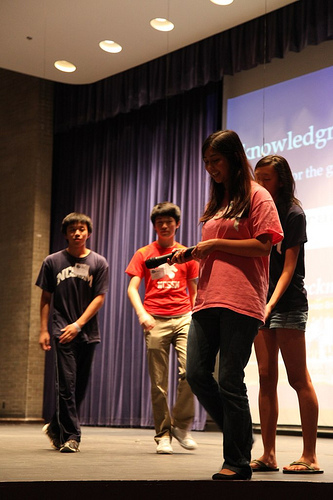Team:Duke/Human Practices
From 2012.igem.org
Engineering New Human Practices for the 21st Century
The 2012 Duke iGEM Team has approached human practice through a variety of methods including collaborations with other teams, examination of current synthetic biology policy, and helping start up and mentor local High School iGEM chapters.
Contents |
Collaboration at College Level
The Duke iGEM Team has sought to collaborate with other teams at both the college and high school level as well as draw disseminate information about synthetic biology throughout our local communities. Mouse over the collaboration badge we received from iGEM TU_Munich below to see the animation!
This badge marks the collaboration between the Duke iGEM Team and iGEM TU_Munich. This "Original Bavarian Collaboration-Medal" indicates that the Duke iGEM Team collaborated with iGEM TU_Munich by providing feedback for one of their Human Practice Studies.
Outreach at High School level
Photo taken at the 2012 iGEM HS Jamboree. Attributed to iGEM and Vinoo Selvarajah
In addition to collaborating with college teams, the Duke iGEM Team played a direct hand in starting and mentoring the 2012 North Carolina School of Science and Math (NCSSM) highschool iGEM Team. One of Duke iGEM's undergraduate members, Peter Fan, co-founded and co-lead the team as a senior in high school after participating with Duke iGEM 2011. Peter and his research partner, Aakash Indurkhya, applied for grants to fund the team, presented the 2011 Duke iGEM Team's research project to their student body in order to generate interest, and provided mentorship. The NCSSM iGEM Team performed spectacularly in their first year and earned the title of 1st Runner Up (2nd Place overall) and honorable mention for best new biological part--natural at the 2012 iGEM HS Jamboree. More information about the 2012 NCSSM iGEM Team can be found on their wiki at:
Although he's now graduated Peter hopes that the NCSSM iGEM Team will continue to be successful in their research endeavors and has become an AlumniGEM high school mentor. He's currently attempting to establish iGEM Teams at other local high schools in his community. In addition, he's attempting to gather interest at UNC-Chapel Hill for a synthetic biology pilot program which will be added to UNC-Chapel Hill's Biomedical Engineering Department and hopefully will result in a 2013 UNC-CH iGEM Team.
New Human Practice--Guide to Synthetic Biology Resources for Beginners
Thinking back to when they first started learning about Synthetic Biology the Duke iGEM Team realized just how difficult it had been to take those first steps into the world of Synthetic Biology. As a result of this realization and their continuing efforts to work with the NCSSM iGEM HS Team the Duke iGEM Team developed a comprehensive list of Synthetic Biology resources for beginners. These tutorials contain both text and multimedia resources and were used to instruct the 2012 NCSSM iGEM HS Team with great results. The resources are listed below in no particular order although they will later be compiled into an unofficial "Synthetic Biology for Amateurs" guide. These Resources each have a short description and are complemented by several journal articles and books who's titles are also listed below.
Online Resources
http://www.tinkercell.com/Home (This was the network modeling software we used to build/test the networks we designed and show that they worked in silico. We encountered some problems with the software at times since we didn't download all of the plug-ins/extensions but found it to be extremely powerful once operational.)
http://partsregistry.org/Help:Parts (It has a lot of links to pages on individual parts such as promoters, RBS's, protein domains, backbones etc. which helped us understand some more about the nuances of using each part in a network.)
http://www.nature.com/scitable (Wealth of mini-courses on a variety of different aspects of genetics/molecular bio. I also found that http://www.nature.com/scitable/blog/bio2.0 had very interesting articles about recent developments in synthetic bio such as the creation of a "genetic switchboard" network. I contacted the writer and he works in a Synthetic Bio lab at Davidson which had one of the first iGEM Teams.)
http://openwetware.org/images/3/3d/SB_Primer_100707.pdf (Gives a decent background on the underlying molecular biology.)
https://igem.org/Videos/Lecture_Videos (We used these tutorials along with MIT's Open Course Ware Bio101 videos to teach our high school team this past year.)
https://2012hs.igem.org/Resources (This summer our lab provided us with protocols but before that we used some of these protocols.)
Books (For more advanced reading)
http://www.pearsonhighered.com/educator/product/Molecular-Biology-of-the-Gene/9780805395921.page Molecular Biology of the Gene by James D. Watson (et. al)
http://www.garlandscience.com/product/isbn/0815341636 Physical Biology of the Cell by Rob Philips (et. al)
http://books.google.com/books/about/An_Introduction_to_Systems_Biology.html?id=pAUdPQlCZ54C An Introduction to Systems Biology: Design Principles of Biological Circuits by Uri Alon
Alumni Relations
(membership years are listed in brackets)
The Duke iGEM Team has communicated with, sought mentorship from, and most importantly shared stories with a great deal of Duke iGEM Alumni. Alumni's members communicated with include:
Cory Li (2007)
Nicholas Tang (2006-2010)
Aakash Indurkhya (2011)
Sagar Indurkhya (2006)
and long time Team Lead/former President of Duke iGEM Kevin Chien (2007-2011).
 "
"



